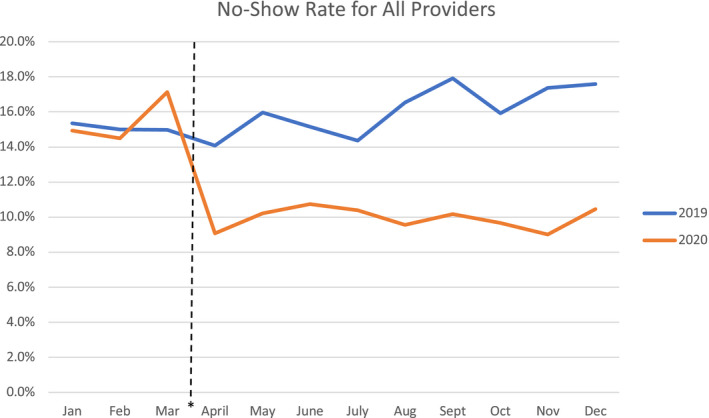TO THE EDITOR: The coronavirus disease 2019 (COVID‐19) pandemic has drastically altered the way we deliver care. Overnight, health care professionals across all specialties were required to pivot from in‐person to telemedicine visits, in order to provide continuity of care while minimizing the risk of COVID‐19 transmission. In response to Dr. Robert F. Kushner’s early observations in “What COVID‐19 is Teaching Us About Counseling for Weight Management” (1), we providers at the Comprehensive Weight Control Center at Weill Cornell Medicine in New York, New York, and the Center for Weight Management at Scripps Health in San Diego, California, sought to explore the shifts in patient volume and attendance since telemedicine conversion (2).
We conducted a cohort comparison study of all new and follow‐up visits in 2019 and 2020 at two multispecialty, insurance‐based, comprehensive weight‐management centers. Monthly appointment data for scheduled, completed, and cancelled visits with physicians, nurse practitioners, and/or physician assistants were extracted, and the no‐show rate was calculated as the percentage of noncompleted visits in relationship to the total number of scheduled visits over each month and cumulatively over 1 year. No‐show rates were compared descriptively between each month of 2019 and 2020 (Figure 1). In 2019, there were 4,673 no‐show visits of the 29,629 scheduled visits (15.8% no‐show rate), and in 2020, there were 2,824 no‐show visits of the 24,633 scheduled visits (11.5% no‐show rate), representing a significant 27.2% reduction in the annual no‐show rate (χ2 P < 0.05). With the transition to telemedicine, there has been a rise in completed new and follow‐up visits, as well as a reduction in no‐show visits.
Figure 1.

No‐show rate for in‐person visits in 2019 and video visits after March 2020. Annual no‐show rate in 2019 of 15.8% compared with annual no‐show rate in 2020 of 11.5%, P < 0.05. *Dates of implementation of stay‐at‐home orders in New York (March 22, 2020) and California (March 19, 2020) and transition to video visits at CWCC (March 16, 2020) and Scripps Health (March 24, 2020). CWCC, Comprehensive Weight Control Center.
The cause for improved appointment adherence is likely multifactorial. With the need for obesity treatment far exceeding the number of trained obesity medicine specialists, patients may travel significant distances for appropriate care and often face other common barriers (e.g., taking time off from work, arranging childcare). Telemedicine removes these barriers and saves patients both time and cost (3). Lastly, obesity being a risk factor for increased COVID‐19 severity could be incentivizing patients to prioritize obesity treatment (4).
Weight‐loss outcomes are improved with better attendance and adherence (5), which telemedicine has significantly improved during the COVID‐19 pandemic. Further studies are necessary to evaluate clinical weight outcomes in the setting of video visits versus in‐person visits and the utility of implementing telemedicine into standard clinical practice. Telemedicine is posed to be an instrumental tool for delivering effective obesity management.
Disclosure
LA declared receiving consulting fees from, and serving on, advisory boards for ERX, Jamieson Laboratories, Pfizer, Novo Nordisk, Sanofi, Janssen, UnitedHealth Group Ventures, and Gelesis; receiving research funding from Lilly, Janssen, Allurion, and Novo Nordisk; having an equity interest in Intellihealth, ERX, Zafgen, Gelesis, MYOS, and Jamieson Laboratories; and serving on a board of directors for MYOS, Intellihealth, and Jamieson Laboratories outside the submitted work. All other authors declared no conflict of interest.
References
- 1. Kushner RF. What COVID‐19 is teaching us about counseling for weight management. Obesity (Silver Spring) 2020;28:2036‐2037. [DOI] [PMC free article] [PubMed] [Google Scholar]
- 2. Centers for Medicare and Medicaid Services . COVID‐19 emergency declaration blanket waivers for health care providers. Updated May 24, 2021. Accessed February 14, 2021. https://www.cms.gov/files/document/summary‐covid‐19‐emergency‐declaration‐waivers.pdf
- 3. Bynum AB, Irwin CA, Cranford CO, Denny GS. The impact of telemedicine on patients’ cost savings: some preliminary findings. Telemed J E Health 2003;9:361‐367. [DOI] [PubMed] [Google Scholar]
- 4. Popkin BM, Du S, Green WD, et al. Individuals with obesity and COVID‐19: a global perspective on the epidemiology and biological relationships. Obes Rev 2020;21:e13128. doi: 10.1111/obr.13128 [DOI] [PMC free article] [PubMed] [Google Scholar]
- 5. Chopra S, Malhotra A, Ranjan P, et al. Predictors of successful weight loss outcomes amongst individuals with obesity undergoing lifestyle interventions: a systematic review. Obes Rev 2021;22:e13148. doi: 10.1111/obr.13148 [DOI] [PubMed] [Google Scholar]


